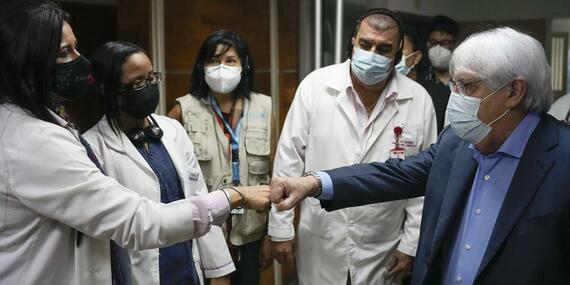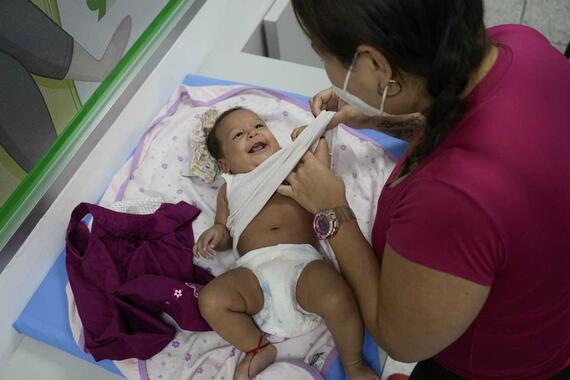USG Griffiths calls for solidarity and increased support for the Venezuelan people

The Under-Secretary-General for Humanitarian Affairs and Emergency Relief Coordinator, Martin Griffiths, completed his visit to Venezuela on Tuesday (2 August) his first to Latin America since his appointment in 2021.
During his mission, Mr. Griffiths met with the President of the Republic, the President of the National Assembly, the Executive Vice President, Sectoral Vice Presidents, the opposition delegation to the Mexico dialogue, UN agencies, and national and international NGOs. Together, they discussed ways to strengthen efforts to ensure that the needs of the most vulnerable people are met, and that opportunities are created so that Venezuelans can start to rebuild their lives and livelihoods and meet their aspirations for the future.
"I am heartened to see that the economy is showing signs of recovery," said Mr. Griffiths. "Important humanitarian needs remain. It is more important than ever that the international community continues to show solidarity with the Venezuelan people, ensuring the most vulnerable, including women, girls, boys and the elderly, are not left behind."
In the capital, Mr. Griffiths visited the Concepción Palacios Maternity Hospital, where he met dedicated medical staff, pregnant women, and mothers with their newborn babies. He heard first-hand how humanitarian support had helped strengthen health services and reduce maternal mortality through technical assistance, the provision of safe water, and the delivery of supplies and equipment.

“I am pleased to say that in my meetings with authorities, we agreed to publish the Humanitarian Response Plan (HRP) for 2022-2023, which will help to unlock critical resources for the well-being of the Venezuelan people,” said Mr. Griffiths. “We further agreed to work together to address access conditions for humanitarian partners.”
The HRP requires US$795 million for this year. It aims to support 5.2 million people with assistance, focusing on supporting health services, improving food security and nutrition, strengthening basic service delivery and education, promoting protection and addressing human mobility. The HRP provides life-saving assistance, builds resilience, restores livelihoods and addresses key protection risks for the most vulnerable population groups.
Mr. Griffiths thanked international donors for their efforts in mobilizing $170 million so far this year, while calling for greater solidarity and increased humanitarian funding from the international community.
“Donors are making important efforts to mobilize humanitarian support for the Venezuelan people, but we must do more,” said Mr. Griffiths, emphasizing that “this also needs to be accompanied by greater development engagement in Venezuela that can build on the momentum created by these early signs of economic recovery and help turn this into opportunities and hope for millions of people.”
Given Venezuela is a country with its own significant resources, Mr. Griffiths also called on the Government, opposition and international community to work together to reach agreements that prioritize the needs of the Venezuelan people, and to channel these resources to address the most pressing humanitarian and social challenges and promote the country’s economic recovery.
Mr. Griffiths also added: “The UN stands ready to support, with Venezuela not only having a unique opportunity to find solutions to address its own challenges, but in a context of global energy and food price crises, it has the potential to contribute to global solutions that can impact the welfare of the most vulnerable.”
